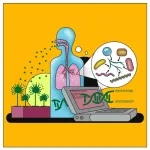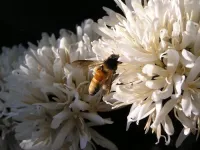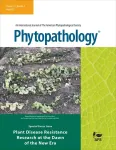(Press-News.org) Aspergillus fumigatus strains that infect humans have a significantly altered metabolism compared to other strains in the environment. At the same time, infection with the fungus leads to an apparent change in the human lung microbiome. Researchers at the Leibniz Institute for Natural Product Research and Infection Biology (Leibniz-HKI) in Jena, Germany, came to this conclusion after using machine learning models to analyze genome data from about 250 fungal strains and lung microbiome data from 40 patients.
The fungus Aspergillus fumigatus is widely distributed in the environment, where it performs important ecological functions. At the same time, it is an opportunistic pathogen of humans. This means that it can infect people with a weakened immune system and cause life-threatening diseases like aspergillosis. Treatment is difficult due to the limited number of drugs available for fungal infections.
However, as researchers at Leibniz-HKI have discovered, fungal strains found in the environment and clinical strains from patient samples differ significantly. In a previous study, the team already found that the genetic information of about 250 Aspergillus fumigatus strains of different origins matched only by about 70 percent. By comparison, the genetic information of humans and pigs is about 95 percent identical.
"In the current study, we focused on what impact these genomic differences have on fungal metabolism in the presence of a complex lung microbiome," said study leader Gianni Panagiotou. He heads the Microbiome Dynamics department at Leibniz-HKI and holds a professorship at Friedrich Schiller University in Jena, Germany. "Understanding what might drive fungal growth, and thus survival, of A. fumigatus in different habitats might advance the development of prophylactic or therapeutic strategies to control the fungal pathogen levels."
The research team developed computer models that predict metabolic reactions and products for the 250 different strains, based on the genome data and current knowledge of metabolic pathways. "In doing so, we found that the clinical strains differ significantly from the environmental strains, especially in the area of amino acid synthesis," says Mohammad Mirhakkak, one of the two lead authors.
Mirhakkak and his co-first author Xiuqiang Chen then used the model they developed to study samples from 40 patients with cystic fibrosis before and after confirmed Aspergillus fumigatus infection. Using metagenome data from the samples, they were able to decipher the composition of the lung microbiome before and after infection. In other words, they determined microorganisms that live in each patient's lungs. "We used these data to feed our model and found that Aspergillus fumigatus appears to shape the lung microbiome to its advantage," Chen explains. Even when the researchers simulated so-called knockouts - strains of fungi that are not viable on their own because certain metabolic pathways have been turned off - they survived thanks to the help of the lung microbiome. At least in the computer simulation, other microorganisms then took over the production of vital metabolites.
"Our results show that when developing new drugs, we need to keep in mind, on the one hand, the enormous variability of the metabolism of Aspergillus fumigatus, and on the other hand, that we also need to keep the entire microbiome in mind," Panagiotou said.
The study was funded by the German Research Foundation as part of the Collaborative Research Center (Transregio) FungiNet and the Cluster of Excellence Balance of the Microverse, and by the German Federal Ministry of Education and Research.
END
A fungus gets comfortable
Aspergillus fumigatus adapts to life in humans - and shapes their lung microbiome
2023-08-07
ELSE PRESS RELEASES FROM THIS DATE:
CEHD researchers receive funding for project on quantum teaching & learning in elementary classrooms
2023-08-07
Nancy Holincheck, Assistant Professor, Advanced Studies in Teaching and Learning, School of Education; Jessica Rosenberg, Associate Professor, Physics and Astronomy; Stephanie Dodman, Associate Professor, School of Education; and Benjamin Dreyfus, Associate Professor, Physics and Astronomy, received funding from the National Science Foundation for the project: "EAGER: Quantum is Elementary: Quantum Teaching & Learning in Elementary Classrooms."
The researchers will study learning associated with elementary teachers' engagement in professional learning and elementary students' learning related to quantum science, quantum thinking, and careers. The ...
More work needed to unlock mysteries of Asia’s bees
2023-08-07
Although the collapse of hives of European honey bees (Apis mellifera) has gained worldwide attention in recent years, there are massive gaps in knowledge of other bee species, particularly in the Asian region, which contains over half the world’s human population and where food security (in which bees play a key role) remains a major challenge.
According to a recent global analysis, only 1% of the global public data on bee distribution comes from Asia, even though 15% of the world’s bee species are thought to live there.
In a new paper, “Opportunities and challenges in Asian bee research and conservation”, published in the journal ...
Symptoms of the body and the mind are frequent fellow travelers
2023-08-07
INDIANAPOLIS – Chronic pain is often accompanied by depression and anxiety. In an invited commentary published in JAMA Network Open, Kurt Kroenke, M.D., of Regenstrief Institute and Indiana University School of Medicine, discusses the relationship between pain, the most common symptom for which individuals visit a physician, and depression and anxiety, the two most prevalent mental health conditions worldwide. He highlights the importance of not neglecting psychological symptoms in patients experiencing pain.
“One of the reasons for the bi-directional linkage between pain and depression, as well as anxiety, is the existence of a feedback ...
T. Boone Pickens Foundation donates $20 million to Wilmer Eye Institute, Johns Hopkins Medicine
2023-08-07
The T. Boone Pickens Foundation, established by the late, Texan innovative energy leader and philanthropist, is donating $20 million to the Wilmer Eye Institute, Johns Hopkins Medicine. The gift, announced in 2013, is one of the largest research donations in Wilmer’s history. It will fund vision-saving research and a professorship.
Pickens’ interest in the treatment and research of eye conditions developed in the 1980s after his father’s diagnosis of macular degeneration, a progressive condition that disrupts the central field of vision and causes ...
SwRI helps create open-source software to assist rail industry decarbonization efforts
2023-08-07
SAN ANTONIO — August 7, 2023 —Southwest Research Institute is helping the freight rail industry assess potential pathways to decarbonization with a new open-source modeling and simulation software known as ALTRIOS. ALTRIOS, the Advanced Locomotive Technology and Rail Infrastructure Optimization System, can simulate the real-world impacts and expenses related to adopting alternative energy locomotive technologies and expanding associated infrastructure.
Now publicly available for download, ALTRIOS supports several simulation modes to provide rail industry stakeholders with optimal strategies for implementing ...
A promising investigational therapeutic monoclonal antibody to treat chronic hepatitis B and D infections
2023-08-07
Affecting hundreds of millions of people, chronic hepatitis B is a widespread global health problem for which there is as yet no cure. In a preclinical study involving the German Center for Infection Research (DZIF), Heidelberg University Hospital, University Medical Center Hamburg-Eppendorf and the US company Vir Biotechnology, the potential of an engineered investigational human monoclonal antibody for the treatment of chronic hepatitis B and hepatitis D has been demonstrated. Based on the results, clinical trials with the monoclonal antibody VIR-3434 are ongoing.
Chronic hepatitis B ...
Study: People expect others to mirror their own selfishness, generosity
2023-08-07
CHAMPAIGN, Ill. — New research shows that a person’s own behavior is the primary driver of how they treat others during brief, zero-sum-game competitions. Generous people tend to reward generous behavior and selfish individuals often punish generosity and reward selfishness – even when it costs them personally. The study found that an individual’s own generous or selfish deeds carry more weight than the attitudes and behaviors of others.
The findings are reported in the journal Cognitive Science.
Previous research into this arena of human behavior suggested that social norms are the primary factor guiding a person’s decision-making in competitive scenarios, ...
Gene grants powerful resistance to resurging plant disease
2023-08-07
While wrapping oneself in 100% Egyptian cotton bedsheets is a delightful luxury on a warm summer night, cotton provides much more than breathable, soft fabric. In addition to textiles, the cotton plant is grown for food, fuel, and daily-use consumer products—such as coffee filters, currency, and moisturizers. However, a resurging plant disease called bacterial blight is currently threatening cotton production worldwide.
Bacterial blight is best controlled through natural, genetic resistance. ...
Study reveals successful strategies for removing invasive caimans from Florida Everglades
2023-08-07
The spectacled caiman, a species native to Central and South America, has been established in Florida since the 1970s. The pet trade and crocodilian farming industries, escapes and deliberate releases made it possible for caimans to invade the Florida Everglades.
They pose a threat to native wildlife occupying the same habitat as our native alligators and crocodiles, competing for food and other resources. Meanwhile, they also prey upon birds, small mammals, fish and other reptiles.
In a new University of Florida study, published in the journal Management of Biological Invasions, wildlife ...
Medical schools selected for quality improvement curriculum project
2023-08-07
ROCKVILLE, Md.—Ten medical schools have been selected to participate in a two-year quality improvement project to refine, implement and assess a competency-based obesity education curriculum, The Obesity Society (TOS) announced today. Nationally and internationally, numerous medical organizations have highlighted the need for more medical school training on the science and practice of obesity care. This program is a first step to fill that need.
In addition to having access to 12 curated obesity education ...
LAST 30 PRESS RELEASES:
EANM launches new award to accelerate alpha radioligand therapy research
Globe-trotting ancient ‘sea-salamander’ fossils rediscovered from Australia’s dawn of the Age of Dinosaurs
Roadmap for Europe’s biodiversity monitoring system
Novel camel antimicrobial peptides show promise against drug-resistant bacteria
Scientists discover why we know when to stop scratching an itch
A hidden reason inner ear cells die – and what it means for preventing hearing loss
Researchers discover how tuberculosis bacteria use a “stealth” mechanism to evade the immune system
New microscopy technique lets scientists see cells in unprecedented detail and color
Sometimes less is more: Scientists rethink how to pack medicine into tiny delivery capsules
Scientists build low-cost microscope to study living cells in zero gravity
The Biophysical Journal names Denis V. Titov the 2025 Paper of the Year-Early Career Investigator awardee
Scientists show how your body senses cold—and why menthol feels cool
Scientists deliver new molecule for getting DNA into cells
Study reveals insights about brain regions linked to OCD, informing potential treatments
Does ocean saltiness influence El Niño?
2026 Young Investigators: ONR celebrates new talent tackling warfighter challenges
Genetics help explain who gets the ‘telltale tingle’ from music, art and literature
Many Americans misunderstand medical aid in dying laws
Researchers publish landmark infectious disease study in ‘Science’
New NSF award supports innovative role-playing game approach to strengthening research security in academia
Kumar named to ACMA Emerging Leaders Program for 2026
AI language models could transform aquatic environmental risk assessment
New isotope tools reveal hidden pathways reshaping the global nitrogen cycle
Study reveals how antibiotic structure controls removal from water using biochar
Why chronic pain lasts longer in women: Immune cells offer clues
Toxic exposure creates epigenetic disease risk over 20 generations
More time spent on social media linked to steroid use intentions among boys and men
New study suggests a “kick it while it’s down” approach to cancer treatment could improve cure rates
Milken Institute, Ann Theodore Foundation launch new grant to support clinical trial for potential sarcoidosis treatment
New strategies boost effectiveness of CAR-NK therapy against cancer
[Press-News.org] A fungus gets comfortableAspergillus fumigatus adapts to life in humans - and shapes their lung microbiome







